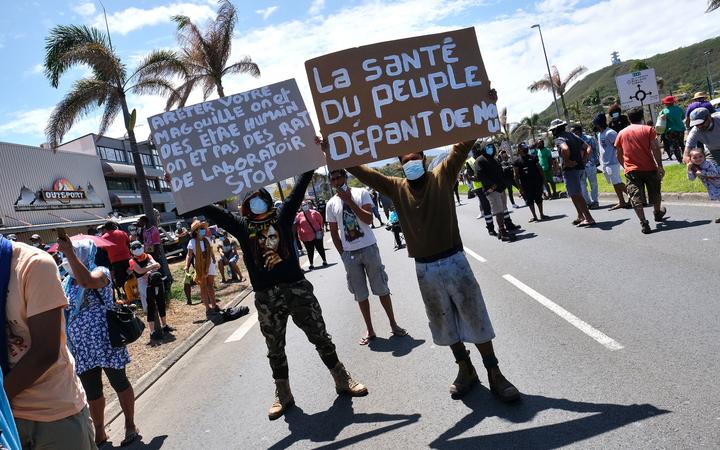Climate activists protested outside the U.N. climate summit in Glasgow Monday spotlighting the role of the U.S. military in fueling the climate crisis. The Costs of War project estimates the military produced around 1.2 billion metric tons of carbon emissions between 2001 and 2017, with nearly a third coming from U.S. wars overseas. But military carbon emissions have largely been exempted from international climate treaties dating back to the 1997 Kyoto Protocol after lobbying from the United States. We go to Glasgow to speak with Ramón Mejía, anti-militarism national organizer of Grassroots Global Justice Alliance and Iraq War veteran; Erik Edstrom, Afghanistan War veteran turned climate activist; and Neta Crawford, director of the Costs of War project. “The United States military has been a mechanism of environmental destruction,” says Crawford.
AMY GOODMAN: Former U.S. President Barack Obama addressed the U.N. climate summit Monday, criticizing the leaders of China and Russia for not attending the talks in Glasgow.
BARACK OBAMA: Most nations have failed to be as ambitious as they need to be. The escalation, the ratcheting up of ambition that we anticipated in Paris six years ago has not been uniformly realized. I have to confess, it was particularly discouraging to see the leaders of two of the world’s largest emitters, China and Russia, decline to even attend the proceedings. And their national plans so far reflect what appears to be a dangerous lack of urgency, a willingness to maintain the status quo on the part of those governments. And that’s a shame.
AMY GOODMAN: While Obama singled out China and Russia, climate justice activists openly criticized President Obama for failing to deliver on climate pledges he made as president and for his role overseeing the world’s largest military. This is Filipina activist Mitzi Tan.
MITZI TAN: I definitely think that President Obama is a disappointment, because he lauded himself as the Black president who cared about the people of color, but if he did, he wouldn’t have failed us. He wouldn’t have let this happen. He wouldn’t have killed people with drone strikes. And that is connected to the climate crisis, because the U.S. military is one of the biggest polluters and causing the climate crisis also. And so there are so many things that President Obama and the U.S. has to do in order to really claim that they are the climate leaders that they’re saying they are.
AMY GOODMAN: Speakers at last week’s large Fridays for Future rally in Glasgow also called out the U.S. military’s role in the climate emergency.
AYISHA SIDDIQA: My name is Ayisha Siddiqa. I come from northern region of Pakistan. … The U.S. Department of Defense has a larger annual carbon footprint than most countries on Earth, and it also is the single largest polluter on Earth. Its military presence in my region has cost the United States over $8 trillion since 1976. It has contributed to the destruction of environment in Afghanistan, Iraq, Iran, the greater Persian Gulf and Pakistan. Not only have Western-induced wars led to spikes in the carbon emissions, they have led to use of depleted uranium, and they have caused poisoning of air and water and have led to birth defects, cancer and suffering of thousands of people.
AMY GOODMAN: The Costs of War project estimates the U.S. military produced around 1.2 billion tonnes of carbon emissions between 2001 and 2017, with nearly a third coming from U.S. wars overseas, including in Afghanistan and Iraq. By one account, the U.S. military is a larger polluter than 140 countries combined, including numerous industrialized nations, such as Sweden, Denmark and Portugal.
However, military carbon emissions have largely been exempted from international climate treaties dating back to the 1997 Kyoto Protocol, thanks to lobbying from the United States. At the time, a group of neoconservatives, including future vice president and then-Halliburton CEO Dick Cheney, argued in favor exempting all military emissions.
On Monday, a group of climate activists staged a protest outside the COP spotlighting the role of the U.S. military in the climate crisis.
We’re joined now by three guests. Inside the U.N. climate summit, Ramón Mejía joins us, the anti-militarism national organizer of Grassroots Global Justice Alliance. He’s an Iraq War vet. We’re also joined by Erik Edstrom, who fought in the Afghan War and later studied climate change at Oxford. He’s the author of Un-American: A Soldier’s Reckoning of Our Longest War. He’s joining us from Boston. Also with us, in Glasgow, is Neta Crawford. She’s with the Costs of War project at Brown University. She’s a professor at Boston University. She’s just outside the COP.
We welcome you all to Democracy Now! Ramón Mejía, let’s begin with you. You participated in protests inside the COP and outside the COP. How did you go from being an Iraq War veteran to a climate justice activist?
RAMÓN MEJÍA: Thank you for having me, Amy.
I participated in the invasion of Iraq in 2003. As part of that invasion, which was a crime, I was able to witness the sheer destruction of Iraq’s infrastructure, of its water treatment plants, of sewage. And it was something that I couldn’t live with myself and I couldn’t continue to support. So, after leaving the military, I had to speak up and to oppose U.S. militarism in every shape, way or form that it shows up in our communities. In Iraq alone, the Iraqi people have been researching and said that they are — have the worst genetic damage that has ever been studied or researched. So, it is my obligation as a war veteran to speak out against wars, and especially how wars impact not only our people, the environment and the climate.
JUAN GONZÁLEZ: And, Ramón Mejía, what about this issue of the role of the U.S. military in fossil fuel emissions? When you were in the military, was there any sense among your fellow GIs about this enormous pollution that the military is visiting on the planet?
RAMÓN MEJÍA: When I was in the military, there wasn’t any discussion about the chaos that we were creating. I conducted resupply convoys throughout the country, delivering munitions, delivering tanks, delivering repair parts. And in that process, I saw nothing but waste being left. You know, even our own units were burying munitions and disposable trash into the middle of the desert. We were burning trash, creating toxic fumes that have impacted veterans, but not only veterans, but the Iraqi people and those adjacent to those toxic burn pits.
So, the U.S. military, while emissions is important to discuss, and it’s important that within these climate conversations that we address how the militaries are excluded and don’t have to reduce or report emissions, we also have to discuss the violence that the militaries wage on our communities, on the climate, on the environment.
You know, we came with a delegation, a frontline delegation of over 60 grassroots leaders, under the banner of It Takes Roots, from Indigenous Environmental Network, from Climate Justice Alliance, from Just Transition Alliance, from Jobs with Justice. And we came here to say that no net zero, no war, no warming, keep it in the ground, because many of our community members have experienced what the military has to offer.
One of our delegates from New Mexico, from the Southwest Organizing Project, spoke to how millions and millions of jet fuel have spilled in Kirtland Air Force Base. More fuel has spilled and leached into the aquifers of neighboring communities than the Exxon Valdez, and yet those conversations aren’t being had. And we have another delegate from Puerto Rico and Vieques, how munitions tests and chemical weapons tests have plagued the island, and while the U.S. Navy is no longer there, cancer still is strickening the population.
JUAN GONZÁLEZ: And the group Global Witness has estimated that there are over 100 coal, oil and gas company lobbyists and their associated groups at COP26. What’s your sense of the impact of the fossil fuel lobby at this gathering?
RAMÓN MEJÍA: There can’t be any genuine discussion about addressing climate change if we’re not including the military. The military, as we know, is the largest consumer of fossil fuels and also the largest emitter of greenhouse gases most responsible for the climate disruption. So, when you have fossil fuel industries that have a larger delegation than most of our frontline communities and the Global South, then we’re being silenced. This space is not a space for genuine discussions. It’s a discussion for transnational corporations and industry and polluting governments to continue to try and find ways to go as business as usual without actually addressing the roots of the conversation.
You know, this COP has been dubbed net zero, the COP of net zero, but this is just a false unicorn. It’s a false solution, just the same way as greening the military is. You know, emissions, it’s important that we discuss it, but greening the military is also not the solution. We have to address the violence that the military wages and the catastrophic effects it has on our world.
So, the conversations within the COP aren’t genuine, because we can’t even hold pointed conversations and hold those accountable. We have to speak in generalities. You know, we can’t say “U.S. military”; we have to say “military.” We can’t say that our government is the one that’s most responsible for pollution; we have to speak in generalities. So, when there is this unlevel playing field, then we know that the discussions aren’t genuine here.
The genuine discussions and the real change is happening in the streets with our communities and our international movements that are here to not only discuss but apply pressure. This — you know, what is it? We’ve been calling it, that the COP is, you know, profiteers. It’s the convening of profiteers. That’s what it is. And we’re here not to concede this space in which power resides. We’re here to apply pressure, and we’re also here to speak on behalf of our international comrades and movements from around the world that aren’t able to come to Glasgow because of vaccine apartheid and the restrictions that they have on coming to discuss what’s happening in their communities. So we’re here to uplift their voices and to continue to speak on — you know, with them, on what’s happening around the world.
AMY GOODMAN: In addition to Ramón Mejía, we’re joined by yet another Marine Corps vet, and he is Erik Edstrom, Afghan War vet, went on to study climate at Oxford and write the book Un-American: A Soldier’s Reckoning of Our Longest War. If you can talk about — well, I’ll ask you the same question as I asked Ramón. Here you were a Marine Corps [sic] veteran. How you went from that to a climate activist, and what we should understand about the costs of war at home and abroad? You fought in Afghanistan.
ERIK EDSTROM: Thank you, Amy.
Yes, I mean, I would be remiss if I didn’t make a brief correction, which is I am an Army officer, or a former Army officer, and don’t want to take heat from my fellow colleagues for being misconstrued as a Marine officer.
But the journey to climate activism, I think, started when I was in Afghanistan and realized that we were solving the wrong problem the wrong way. We were missing the upstream issues underpinning foreign policy around the world, which is the disruption caused by climate change, which endangers other communities. It creates geopolitical risk. And to be focusing on Afghanistan, effectively playing Taliban whack-a-mole, while ignoring the climate crisis, seemed like a terrible use of priorities.
So, immediately, you know, when I was done with my military service, wanted to study what I believe is the most important issue facing this generation. And today, when reflecting upon military emissions in the overall accounting globally, it’s not only intellectually dishonest to exclude them, it is irresponsible and dangerous.
JUAN GONZÁLEZ: And, Erik, I’d like to ask you about the relationship between oil and the military, the U.S. military but also other imperial militaries around the world. There’s historically been a relationship of militaries seeking to control oil resources in times of war, as well as being the prime users of these oil resources to build up their military capacity, hasn’t there?
ERIK EDSTROM: There has been. I think that Amy did a fantastic job laying out, and so did the other speaker, around the military being the largest institutional consumer of fossil fuels in the world, and I think that that definitely drives some of the decision-making in the military. The emissions attributable to the U.S. military is more than civilian aviation and shipping combined. But one of the things I really wanted to drive home in this conversation is around something that’s not discussed very much in the costs of war, which is the social cost of carbon or the negative externalities associated with our global bootprint as a military around the world.
And Amy was right to point out that — citing the Brown University Watson Institute and the 1.2 billion metric tons of estimated emissions from the military during the time of the global war on terror. And when you look at public health studies that start to do the calculus to say how many tonnes must you emit in order to harm somebody elsewhere in the world, it’s about 4,400 tonnes. So, if you do the simple arithmetic, the global war on terror has potentially caused up the 270,000 climate-related deaths around the globe, which further heightens and exacerbates an already high cost of war and strategically undermines the very objectives that the military is hoping to achieve, which is stability. And morally, it is also further undermining the very mission statement and the oath of the military, which is to protect Americans and be a global force for good, if you take a globalized or globalization perspective. So, undermining the climate crisis and turbocharging it is not the role of the military, and we need to apply additional pressure for them to both disclose and reduce its massive carbon footprint.
AMY GOODMAN: To put Juan’s more eloquent question into — I remember this sad joke with the U.S. invasion of Iraq, a little boy saying to his father, “What’s our oil doing under their sand?” I was wondering if you can elaborate more, Erik Edstrom, on what constitutes military emissions. And what does the Pentagon understand? I mean, for years, when we were covering the Bush wars, under George W. Bush, there was the — we would always cite that they’re not talking about their own Pentagon studies saying climate change is the critical issue of the 21st century. But what do they understand, both overall about the issue and the role of the Pentagon in polluting the world?
ERIK EDSTROM: I mean, I think that probably at the senior levels of brass within the military, there is understanding that climate change is a real and existential threat. There is a disconnect, though, which is a point of tension, which is: What is the military going to do specifically about it, and then specifically its own emissions? If the military were to disclose its full carbon footprint and to do so on a regular basis, that number would be deeply embarrassing and create a tremendous amount of political pressure on the U.S. military to reduce those emissions going forward. So you could understand their reluctance.
But nonetheless, we should absolutely count military emissions, because it does not matter what the source is. If it comes from a civilian aircraft or a military aircraft, to the climate itself, it does not matter. And we must count every tonne of emissions, irrespective of whether it is politically inconvenient to do so. And without the disclosure, we are running blind. To prioritize decarbonization efforts, we need to know the sources and volume of those military emissions, so that our leaders and politicians can make informed decisions about which sources they might want to shut down first. Is it overseas bases? Is it a certain vehicle platform? Those decisions will not be known, and we cannot make smart choices intellectually and strategically, until those numbers come out.
AMY GOODMAN: A new research from Brown University’s Costs of War project shows that the Department of Homeland Security has been overly focused on foreign and foreign-inspired terrorism, while violent attacks in the U.S. have more often come from domestic sources, you know, talking about white supremacy, for example. Neta Crawford is with us. She’s just outside the COP right now, the U.N. summit. She’s the co-founder and director of the Costs of War project at Brown. She’s a professor and department chair of political science at Boston University. Professor Crawford, we welcome you back to Democracy Now! Why are you at the climate summit? We usually just talk to you about, just overall, the costs of war.
NETA CRAWFORD: Thanks, Amy.
I’m here because there are several universities in the U.K. which have launched an initiative to try to include military emissions more fully in the individual countries’ declarations of their emissions. Every year, every country that’s in Annex I — that is, the parties to the treaty from Kyoto — have to put some of their military emissions in their national inventories, but it’s not a full accounting. And that’s what we’d like to see.
JUAN GONZÁLEZ: And, Neta Crawford, could you talk about what is not being registered or monitored in terms of the military? It’s not just the fuel that powers the jets of an air force or that powers ships, as well. Given the hundreds and hundreds of military bases that the United States has around the world, what are some of the aspects of the carbon footprint of the U.S. military that people are not paying attention to?
NETA CRAWFORD: OK, I think there’s three things to keep in mind here. First, there are emissions from installations. The United States has about 750 military installations abroad, overseas, and it has about 400 in the U.S. And most of those installations abroad, we don’t know what their emissions are. And that is because of the 1997 Kyoto Protocol decision to exclude those emissions or have them count for the country that the bases are located in.
So, the other thing that we don’t know is a large portion of emissions from operations. So, at Kyoto, the decision was taken not to include operations from war that was sanctioned by the United Nations or other multilateral operations. So those emissions are not included.
There’s also something known as — called bunker fuels, which are the fuels used on planes and aircraft — I’m sorry, aircraft and ships in international waters. Most of the United States Navy’s operations are in international waters, so we don’t know those emissions. Those are excluded. Now, the reason for that was, in 1997, the DOD sent a memo to the White House saying that if missions were included, then the U.S. military might have to reduce its operations. And they said in their memo, a 10% reduction in emissions would lead to a lack of readiness. And that lack of readiness would mean that the United States would not be prepared to do two things. One is be militarily superior and wage war anytime, anywhere, and then, secondly, not be able to respond to what they saw as the climate crisis that we would face. And why were they so aware in 1997? Because they had been studying the climate crisis since the 1950s and 1960s, and they were aware of the effects of greenhouse gases. So, that’s what’s included and what’s excluded.
And there’s another large category of emissions we don’t know about, which is any emission coming out of the military-industrial complex. All of the equipment that we use has to be produced somewhere. Much of it comes from large military-industrial corporations in the United States. Some of those corporations acknowledge their, what are known as direct and somewhat indirect emissions, but we don’t know the entire supply chain. So, I have an estimate that the top military-industrial companies have emitted about the same amount of fossil fuel emissions, greenhouse gas emissions, as the military itself in any one year. So, really, when we think about the entire carbon footprint of the United States military, it has to be said that we’re not counting all of it. And in addition, we’re not counting Department of Homeland Security emissions — I haven’t counted them yet — and those should be included, as well.
AMY GOODMAN: I wanted to —
JUAN GONZÁLEZ: And —
AMY GOODMAN: Go ahead, Juan.
JUAN GONZÁLEZ: Could you talk about burn pits, as well? The U.S. military must be unique in the world, that wherever it goes, it always ends up destroying stuff on the way out, whether it’s a war or an occupation. Could you talk about burn pits, as well?
NETA CRAWFORD: I don’t know as much about burn pits, but I do know something of the history of the environmental destruction that any military makes. From the colonial era to the Civil War, when the Civil War log structures were made from entire forests cut down, or roads were made from trees, the United States military has been a mechanism of environmental destruction. In the Revolutionary War and in the Civil War, and obviously in Vietnam and Korea, the United States has taken out areas, jungles or forests, where they thought that insurgents would hide.
So, the burn pits are just part of a larger sort of disregard for the atmosphere and the environment, the toxic environment. And even the chemicals left at bases, that are leaking from containers for fuel, are toxic. So, there’s a — as both of the other speakers have said, there’s a larger environmental damage footprint that we need to think about.
AMY GOODMAN: Finally, in 1997, a group of neoconservatives, including the future vice president, then-Halliburton CEO Dick Cheney, argued in favor exempting all military emissions from the Kyoto Protocol. In the letter, Cheney, along with Ambassador Jeane Kirkpatrick, former Defense Secretary Caspar Weinberger, wrote, by “exempting only US military exercises that are multinational and humanitarian, unilateral military actions — as in Grenada, Panama and Libya — will become politically and diplomatically more difficult.” Erik Edstrom, your response?
ERIK EDSTROM: I think, indeed, it absolutely will be more difficult. And I think it is our duty, as engaged citizens, to apply pressure on our government to take this existential threat seriously. And if our government fails to step up, we need to be electing new leaders who are going to do the right thing, that will change the tides and will actually put forth the effort that is required here, because, truly, the world depends on it.
AMY GOODMAN: Well, we’re going to end it there but, of course, continue to follow this issue. Erik Edstrom is an Afghan War vet, a graduate from West Point. He studied climate at Oxford. And his book is Un-American: A Soldier’s Reckoning of Our Longest War. Ramón Mejía is inside the COP, anti-militarism national organizer with Grassroots Global Justice Alliance. He is an Iraq War vet. He has been participating in protests inside and outside the COP in Glasgow. And also with us, Neta Crawford, Costs of War project at Brown University. She’s a professor of political science at Boston University.
When we come back, we go to Stella Moris. She’s the partner of Julian Assange. So, what’s she doing at Glasgow, as she talks about how WikiLeaks exposed the hypocrisy of wealthy nations in addressing the climate crisis? And why isn’t she and Julian Assange — why aren’t they able to marry? Is the Belmarsh prison authorities, is Britain saying no? Stay with us.
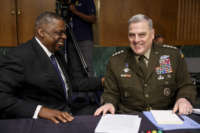

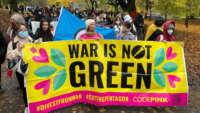
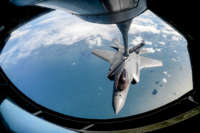
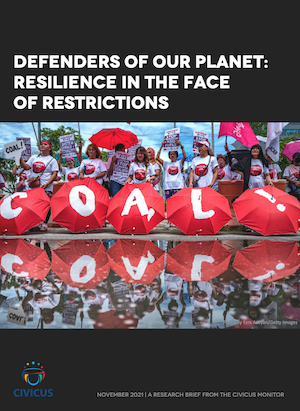

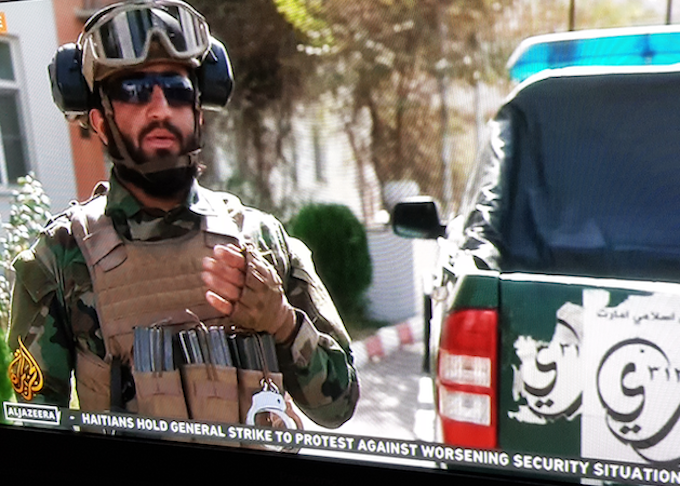




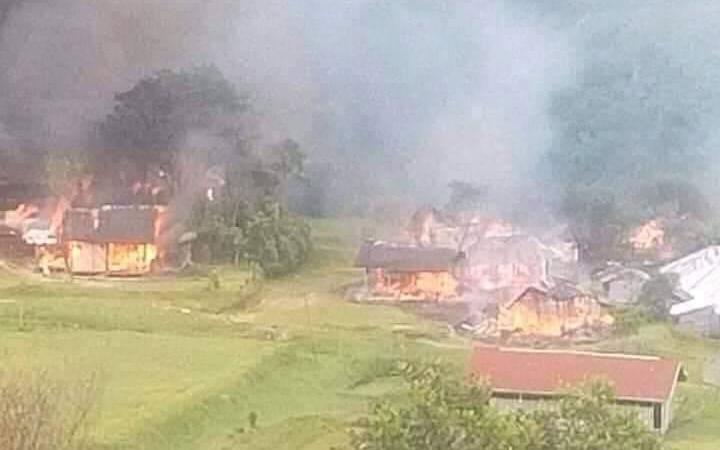
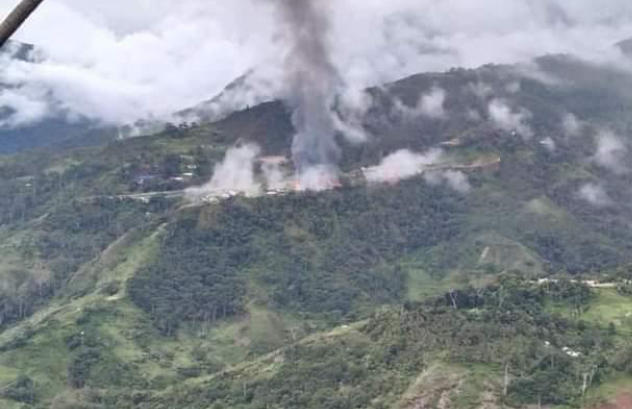
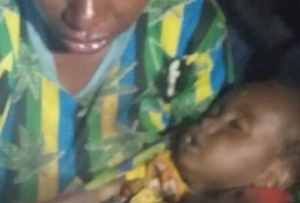

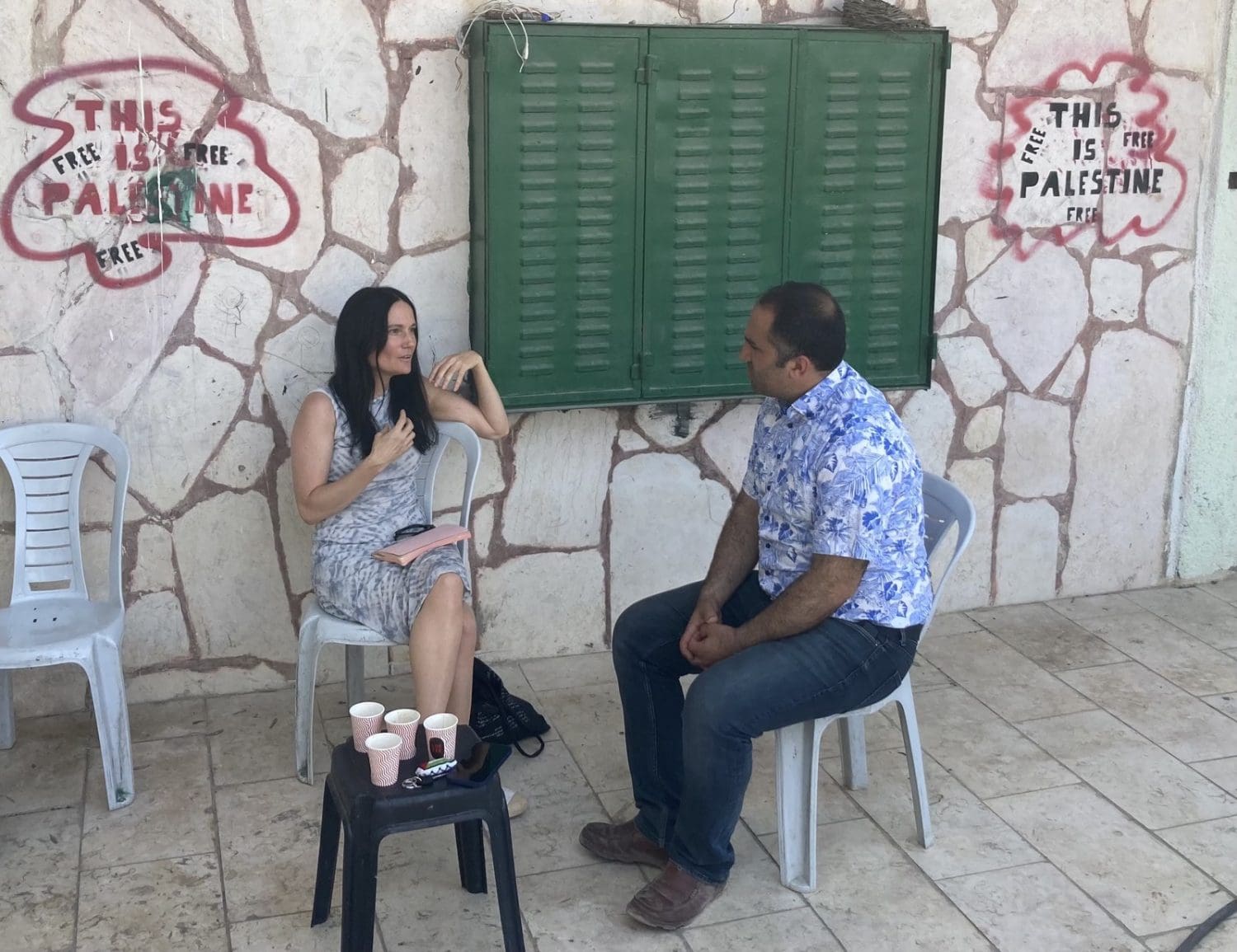
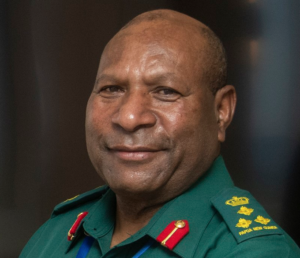
 Palestine Action occupy the ACC Arena roof, venue for the Liverpool Arms Fair, scaling the building to prevent firms including Raytheon, Elbit, ELTA and more from showcasing their weapons of destruction.
Palestine Action occupy the ACC Arena roof, venue for the Liverpool Arms Fair, scaling the building to prevent firms including Raytheon, Elbit, ELTA and more from showcasing their weapons of destruction. 



